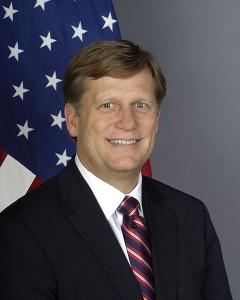This post is part of our special coverage Russia Elections 2011/12.
The March 4, 2012, Russian presidential election played out as many predicted: Vladimir Putin emerged with the majority of the vote. Given that a major theme of this election season is the impact citizen media has had on the political process, perhaps it is fitting that some of the day's drama resulted from a fake Twitter account of the United States’ top diplomat in Moscow.
Fictional Michael McFaul's first tweet was sent on January 24, 2012 – roughly one week after Ambassador McFaul had been sworn in (the fake Twitter account – @McFauI instead of @McFaul- has been suspended, and the links to the tweets quoted below aren't working):

Michael McFaul, Ambassador of the United States of America to the Russian Federation. Photo by the U.S. Department of State, in public domain.
Добрый день! Приветствую вас в моем неофициальном русскоязычном твиттере.
The handful of tweets Fictional McFaul sent before Sunday's presidential election alluded to the Cold War and America's activities surrounding the December 2011 protests in Moscow.
On March 4, Fictional McFaul began tweeting about the elections in Russian.
Желаю России честных выборов сегодня, выборы – это основа демократии и стабильного развития.
@MedvedevRussia лично обещал мне честные выборы в России
10:59am :
@adagamov В России же запрещена агитация в день выборов
@4irikova Вы думаете выборы в России будут честными?
And finally, at 3:08 pm, Fictional McFaul alleged that the validity of the Russian presidential election has been called into question:
Наблюдатели сообщают о большом количестве нарушений на участках по всей стране, это ставит под вопрос легитимность выборов.
The Wall Street Journal Moscow Bureau Blog discussed how, initially, notable Russian figures believed these remarks had indeed originated from the US Ambassador:
Such sentiments, appearing to come from the U.S.’s highest representative in Moscow, were a red rag to the Russian establishment bull, with Margarita Simonyan, editor-in-chief of the Kremlin-backed English-language TV news channel Russia Today, among the first to charge.
“And so it begins,” Ms. Simonyan tweeted. “They don’t even wait for the results, but act straight away.”
Genuine McFaul responded in kind.
At 5:33 pm, he mentioned Fictional McFaul when he announced that he had not been the source of the allegations of election improprieties:
@McFauI @adagamov Someone has put out a false account under my name. Please help your followers understand. My actual account is “verified.”
News of the existence of Fictional McFaul traveled quickly, and Twitter users informed each other on how to distinguish between them.
Official McFaul then retweeted several such announcements in both English and Russian.
Настоящий аккаунт посла США, в России – Майкла @McFaul, верифицирован. Данный аккаунт > @McFauI фейк (вместо l – маленькой, i – большая)
Global Voices Author Alexey Sidorenko (@sidorenko_intl) reminded Twitter users of a similar situation with activist blogger Alexey Navalny:
All Twitter accounts with “L” letter are prone to fakes. L is easily replace by uppercase “i” – this had happened w/ @navalny. Now w/ @mcfaul
Some created fake twitter account for U.S. Ambassador to #Russia, spreading rumors of fraud. Real account: @McFaul; Fake @McFauIw big ‘i’
daniele:
@mschwirtz @McFaul This is a very dirty trick. In any case, the real account is clearly visible with a blue mark on it.
Clever! RT@niktwick The lower case L (l) – capital i(I) trap today made a fake @McFauI famous and gave the real @McFaul a hard time
Ambassador McFaul then retweeted articles from the aforementioned Wall Street Journal Blog and a brief announcement in the Washington Post Business section.
Before signing off, Official McFaul retweeted a Global Voices article, which discussed the Ambassador's efforts to open up a dialogue with the Russian people through social networking sites, as well as the reception these efforts received from Russian bloggers:
Russia: Obama’s McFaul Sworn in as U.S. Ambassador · Global Voices bit.ly/ztysHA Explains @McFaul's Twitter account/Russian internet
This post is part of our special coverage Russia Elections 2011/12.








4 comments
It’s really fascinating how a random individual can stir up a scandal like this so effortlessly. The technical ease created by Twitter is certainly a major factor, but it’s also possible because the fake McFaul user was able to tap into an undercurrent of suspicion and animosity that plagued (and still plagues) Russian electoral politics. It seems that people in Russia (both pro-regime and oppositionist) were eager to believe that McFaul was tweeting politically incautious remarks about the country’s democratic flaws. For some, it confirmed theories about American messianism, and for others (who seek the West’s support) it was perhaps a ray of hope. Really interesting stuff!
McFaul is perhaps the American version of NHL Captain Alexander Ovechkin. Ovechkin keeps getting suspended and coaches complain about him but the whole league respects him. He has integrity, he’s intelligent, and he’s fun to watch. McFaul is a Rhodes Scholar and Russians are familiar with his research. To me, it’s a sign of respect that people are giving him a hard time. There was that quote of what Ovechkin says is the true meaning of controversy:
“I do not get angry with criticism. It’s a good thing. If you are talked about, that means that you are liked and respected. But not in an ordinary form.”
http://globalvoicesonline.org/2012/02/15/russia-u-s-an-overview-of-alexander-ovechkins-nhl-career/